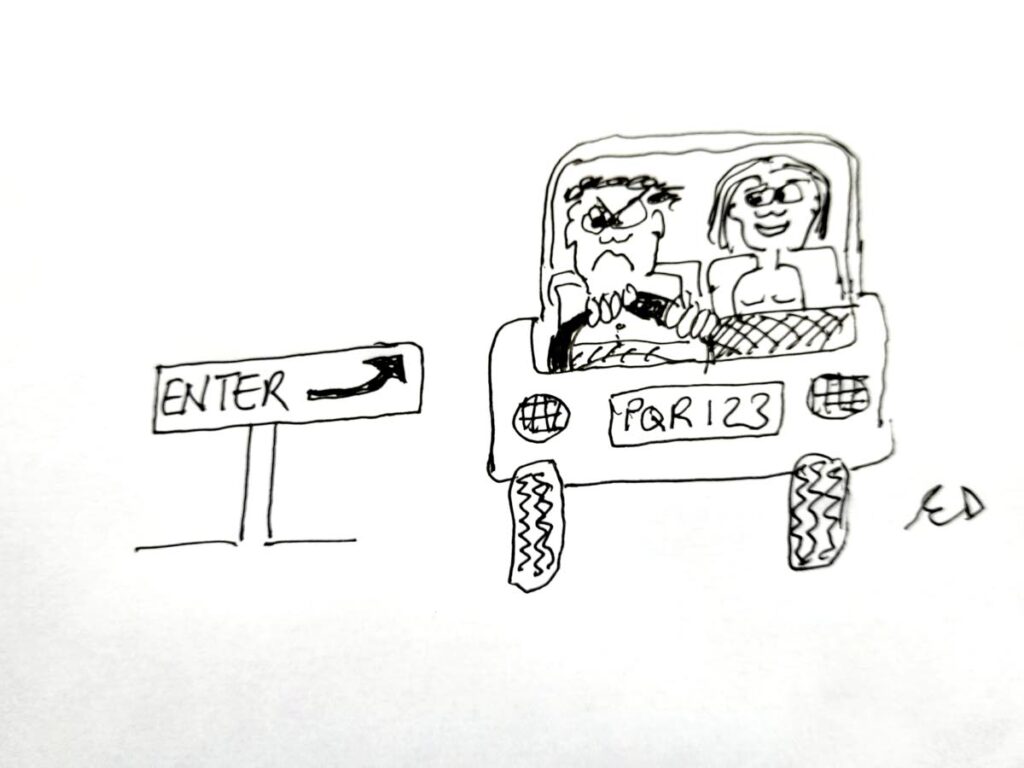The sound of silence

A few days ago, as I was driving through the entrance to the carpark of an establishment, a sedan with a male driver and female passenger was approaching my vehicle. I stopped as we came nose to nose, realising that the driver was aiming to exit via the entrance.
Since many vacationing Trinis sometimes do this (not knowing where the exit is), I thought he was unaware and pulled alongside the vehicle to tell the man it was the entrance. He looked back at me with a blank stare: “Eh heh. I know, but I was here already.” “The exit is over there,” I said politely, motioning to the other side of the carpark.
“Well, I tell you I here already! So I going out here!” Punctuating his departure with an expletive, he proceeded to exit via the entrance with no concern for incoming vehicles.
I have been warned on many occasions that, “in this day and age,” it is not always wise to point out even simple things like this to people; tempers are hot, guns are in too many hands and cutlasses are in most vehicles as a defense weapon.
Even if one addresses an issue gently, politely, respectfully, there is no guarantee that the other person’s reaction will be the same. As a result, many choose the perceived safety of silence.
The recent "spate" of fatal shootings in Tobago has been alarming – even though, as I write this, the total stands at (I believe) "only four" for the year, compared with Trinidad’s rapidly rising count.
A comment on a social media news post about the recent fatal shooting in Signal Hill says: “What going on in this place? Tobagonians, if you know someone has a firearm, say something. We can’t afford to let Tobago go this way.”
The "see something, say something" mantra is easier said than done for many, especially on small islands where "everyone knows everybody." It is common for people to have relatives, spouses or friends who are in the police force. This fact can strike fear in those who want to report "a wrong" but, instead, choose to let it be.

Seeds are planted in small acts. For example, a primary school child throws a mint wrapper on the ground. Depending on who the teacher is, he/she might gently ask the child to pick the wrapper up and point out the benefits of putting it in the bin...or he/she might shout at the child, possibly releasing anger from a frustrating morning at work...or releasing unexpressed emotions from a personal situation...or using shouting as the only approach he/she knows, having experienced it as a child, whenever a "wrong" was committed.
Some may naturally think that the gentle approach is the "better" one. Spoken to gently and with love, a child might feel encouraged to "do good" or "be good," to win the praise of his/her teacher. The repeated process of being "rewarded" for doing what is right may have its ripple effect on choices a child makes throughout life.
Depending on what awaits the child at home, this follow through is not guaranteed. A child may go home and innocently report to his/her parents that "Miss" said not to throw the wrapper on the ground. Would the parent support and reinforce the guidance of "Miss" at home? Would the parent think "What right does Miss have to tell my child what to do?" and march down to the school to deal with the situation in any number of ways?
The role of "culture" can also play a part in the general decision to remain silent. Someone I know once told me that her son would observe children at his Tobago primary school tossing wrappers on the ground whenever they were finished eating snacks. The children would laugh at him for putting his wrapper in the bin and for encouraging them to do the same. One day one of the boys informed him that if they did not throw their wrappers on the ground, there would be nothing for the cleaners to pick up and they would not have jobs. After that, on his mother’s guidance, the child never addressed the issue again.
No number of ten-point plans can address the state and spate of crime in TT until root-level issues resulting from generations of cultural and personal attitudes and beliefs are transformed.
Until then...silence.


Comments
"The sound of silence"